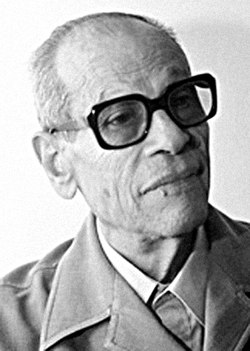Naguib Mahfouz Quote
Related Quotes
To hear never-heard sounds, To see never-seen colors and shapes, To try to understand the imperceptible Power pervading the world; To fly and find pure ethereal substances That are not of matter But o...
Dejan Stojanovic
Tags:
cities, colors, darkness, dejan stojanovic, eagle, ethereal, eyes, face, face of a woman, feel
Sitting in a corner, I live like a toad Oh! How I love my room: my tiny abode! Here I wake up; and I sleep in hereThe world far away; yet virtually near Not that I'm jailed in this place of graceJust...
Munia Khan
Tags:
abode, abode of the living, alone, corner, cyber, cyberspace, depressed, depression, face, far
About Naguib Mahfouz
Naguib Mahfouz Abdelaziz Ibrahim Ahmed Al-Basha (Arabic: نجيب محفوظ عبد العزيز ابراهيم احمد الباشا, IPA: [næˈɡiːb mɑħˈfuːzˤ]; 11 December 1911 – 30 August 2006) was an Egyptian writer who won the 1988 Nobel Prize in Literature. In awarding the prize, the Swedish Academy described him as a writer "who, through works rich in nuance – now clear-sightedly realistic, now evocatively ambiguous – has formed an Arabian narrative art that applies to all mankind". Mahfouz is regarded as one of the first contemporary writers in Arabic literature, along with Taha Hussein, to explore themes of existentialism. He is the only Egyptian to win the Nobel Prize in Literature. He published 35 novels, over 350 short stories, 26 screenplays, hundreds of op-ed columns for Egyptian newspapers, and seven plays over a 70-year career, from the 1930s until 2004. All of his novels are set in Egypt, and always mention the concept of "the lane" as a microcosm of the world. His most famous works include The Cairo Trilogy and Children of Gebelawi. Many of Mahfouz's works have been adapted into Egyptian and international films; Making him one of the most widely adapted Arab authors. While Mahfouz's literature is classified as realist literature, existential themes appear in it.
